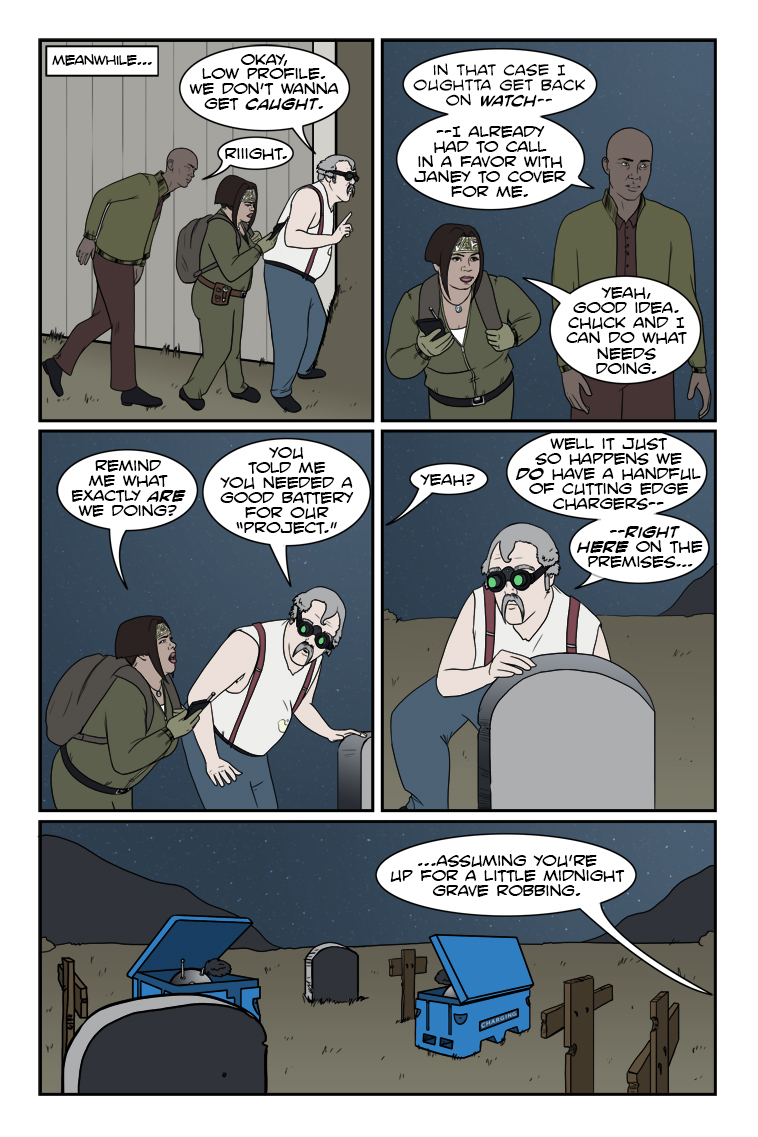Cart
Product categories
Support Us!
If you like what I do please support us on Ko-fi or Patreon.
Follow Us!
Join Our Newsletter!
Vote For Us!
Login
Polls
Events
-
Pasadena Comic Con
Dates: May 24
Location: Pasadena Convention Center, 300 E Green St, Pasadena, CA 91101, USA ( MAP)Details:We will be at the Pasadena Comic Con on January 26th. See some of you there for this one day event!
Purchase tickets online at here: https://www.tixr.com/groups/pcc/events/pasadenacomiccon-pasadena-comic-con-2025-115248
-
San Diego Comic Con: SP-N7
Dates: Jul 23 - 27
Location: San Diego Convention Center, 111 Harbor Dr, San Diego, CA 92101, USA ( MAP)Details:Clint & Dawn Wolf will be at San Diego Comic Con, as Lab Reject Studios. We will be at booth N7 in Small Press.









6 thoughts on “541 – Graverobbers”
Crazyman
“Oh, *that* kind of grave robbing? Lead on, Chuck!” 😈
Dr. Norman (not a real doctor)
What? I say “What”?
Keith
Heh, this is going to be fun. Tradition says you need to drink at least one bottle of MD 20/20 before going to the graveyard.
Honzinator
At first I was thinking of something like a potato battery … nope!
Scarsdale
If you take a dead “D” cell battery, take out the carbon rod from the center, cut a strip of galvanized sheet metal about an inch (2.7 centimeters), take a small jar for canning, suspend the rod in the center and the strip on the side, pour in drain cleaner, you’ll get 1.2 to 1.4 volts DC. 10 of those connected to an inverter will give you 120 VAC at 0.5 amps. Do NOT keep them in the same area you live in however, the fumes will burn your lungs. Just something I learned in chem class in high school. You’d have to top-up the jars every few days, however. Any type of acid will work, even salt water. I think the teacher was a survivalist…
nbaldbiz
Scheffler, Hovland and Conners Share the Lead at P.G.A. Championship
Jordan Spieth, who needs a victory at Oak Hill to complete the career Grand Slam, and Justin Thomas, who won last year’s tournament, just made the cut at five over.
Give this article
Latest Comics
#183. EPISODE EIGHT
47 Aug 19, 2013
#182. 175 – The Big Picture (END OF EPISODE 7)
48 Jul 10, 2013
#181. 174 – Call Waiting
48 Jul 03, 2013
#180. 173 – A Bang And A Whimper
14 Jun 26, 2013
#179. 172 – Rising Hatred
18 Jun 19, 2013
#178. 171 – Guilty As Charged
14 Jun 12, 2013
#177. 170 – The High Hand
12 Jun 05, 2013
#176. 169 – Frank Advice
14 May 22, 2013
#175. 168 – Poor Tactical Positioning
13 May 15, 2013
#174. 167 – The Punch Line
13 May 08, 2013
#173. 166 – Civilization Is The Last Resort
19 May 01, 2013
#172. 165 – Just Shoot Her
14 Apr 24, 2013
#171. 164 – Downed And Dirty
17 Apr 17, 2013
#170. 163 – We Got A Jumper
14 Apr 10, 2013
#169. 162 – No Time To Argue
13 Apr 03, 2013
#168. 161 – Just Following Orders
14 Mar 27, 2013
#167. 160 – Preaching On The Cross
16 Mar 20, 2013
#166. 159 – Spray And Pray
12 Mar 13, 2013
#165. 158 – Live Bait
11 Feb 27, 2013
#164. 157 – Don’t Get Cocky
12 Feb 20, 2013
Latest Chapters
Episode 22
Episode 21
Episode 20
Episode 19
Episode 18
Episode 17
541 – Graverobbers
WonderCon 2025 is coming soon, so the next comic is planned for April 9th.
In the meantime, relevant previousness for this week's page:
https://www.zombieranchcomic.com/comic/223-surrounded-by-film-end-of-episode-9/
https://www.zombieranchcomic.com/comic/483-solar-systems/
Pop culture timekeeping…
Calendar
BlueSky Latest Posts
Writer’s Blog Archives